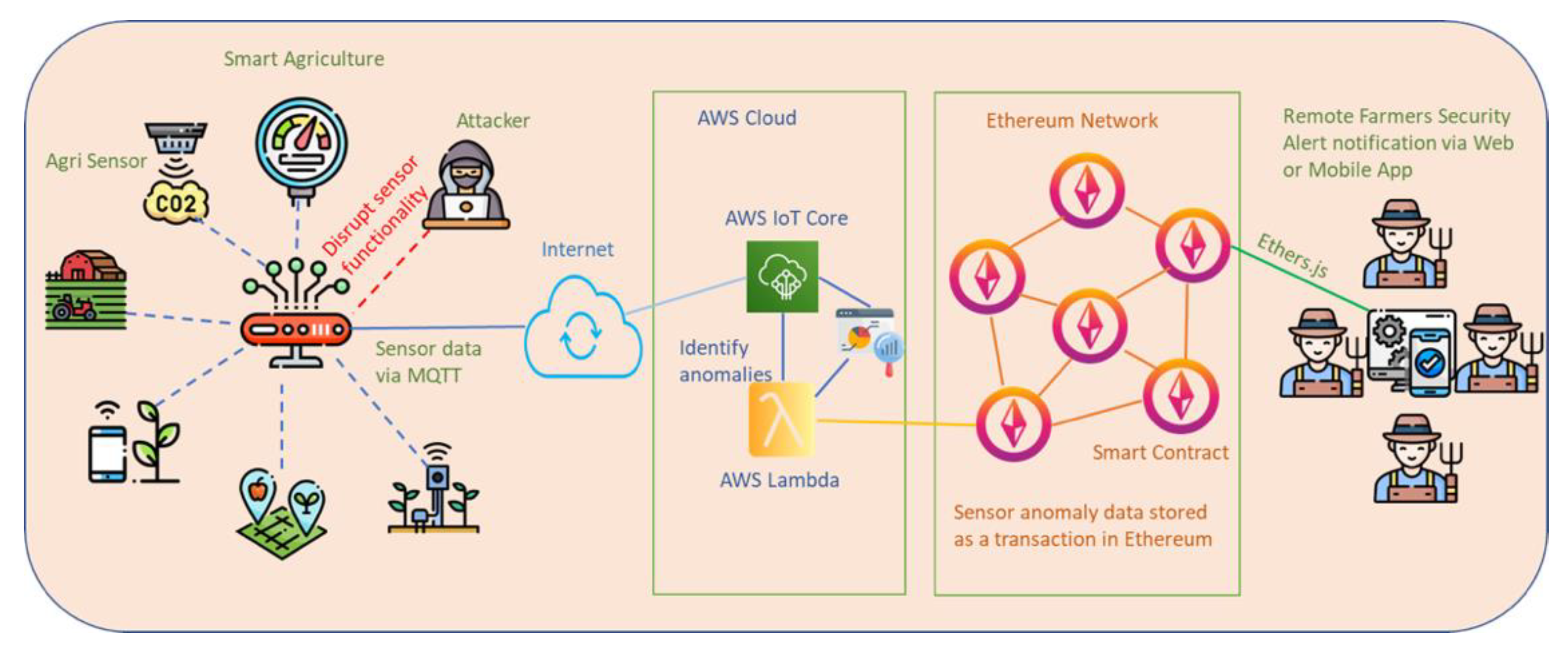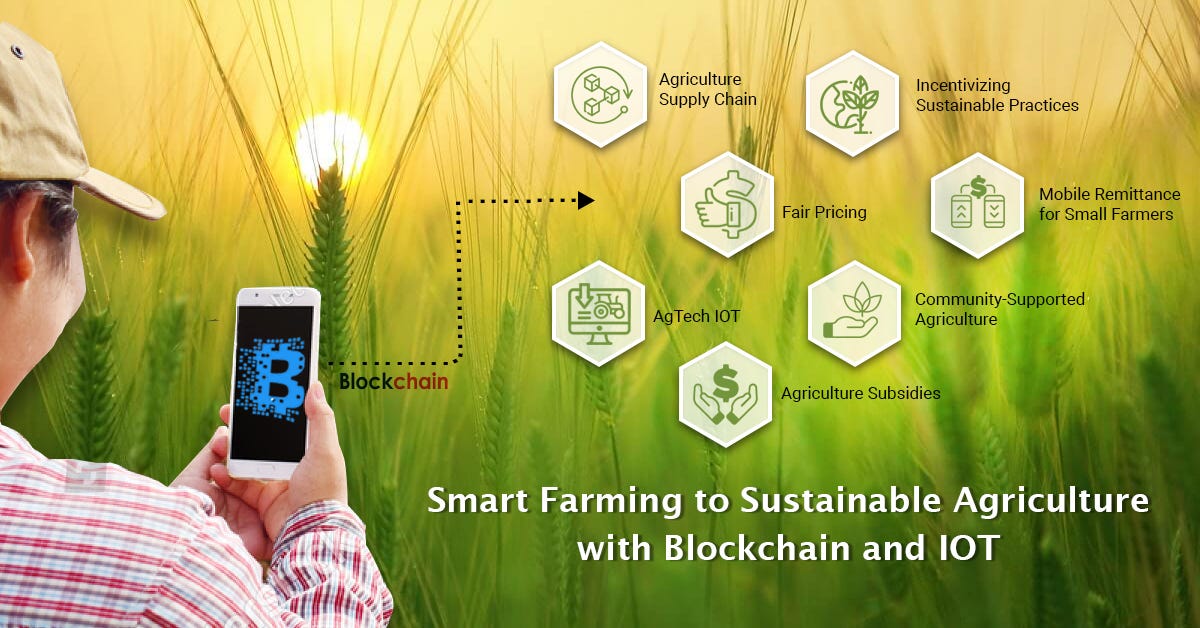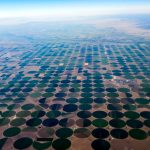Imagine a world where every seed, drop of water, and ray of sunlight is optimally used. A world where your farm operates like a well-oiled machine, increasing yields while conserving resources.
You don’t have to imagine it for long, because blockchain technology is making this vision a reality in smart farming. Have you ever thought about how technology can transform your farming practices, making them more efficient and sustainable? With blockchain, you can track every aspect of your farm with precision, ensuring transparency and trust in your operations.
As you dive into this article, discover how integrating blockchain into your smart farming practices can revolutionize your approach, saving you time, money, and effort. Are you ready to unleash the potential of your farm? Read on to explore how you can harness the power of blockchain technology in your agricultural endeavors.

Blockchain Basics
Blockchain technology is transforming many industries, including smart farming. This digital ledger system records transactions securely. Its decentralized nature makes it trustworthy. Understanding blockchain basics is crucial for smart farming success.
What Is Blockchain?
Blockchain is a chain of blocks. Each block stores data. It is linked to the previous block. This forms a secure chain. It is decentralized, meaning no single entity controls it. This ensures data integrity and security.
How Blockchain Works
Blockchain uses cryptography to secure data. Each transaction is verified by network participants. These participants are called nodes. Once verified, transactions are added to the chain. This process ensures transparency and security.
Blockchain’s Importance In Smart Farming
Smart farming relies on accurate data. Blockchain provides a reliable data source. It helps track crops from farm to table. This ensures quality and safety. Blockchain also reduces fraud. Farmers gain trust and confidence in their produce.

Enhancing Transparency
Blockchain technology is reshaping industries, and smart farming is no exception. One of the most compelling benefits of blockchain in agriculture is its ability to enhance transparency. Imagine knowing exactly where your food comes from, how it was grown, and the journey it took to reach your plate. This level of visibility is not just a luxury; it’s becoming a necessity as consumers demand more information about their food sources.
Enhancing Transparency In Supply Chains
Supply chains in agriculture are often complex and opaque. Blockchain technology simplifies this by providing a transparent ledger that records every transaction. You can trace the journey of agricultural products from farm to table with ease. This transparency builds trust among consumers and producers alike.
Consider the case of organic produce. With blockchain, consumers can verify the authenticity of organic claims without relying solely on labels. This is crucial in an age where food fraud is rampant.
Real-time Data Access
Blockchain allows farmers to access real-time data about their produce. This can include information on weather patterns, soil conditions, and market prices. Such data empowers farmers to make informed decisions quickly. Imagine a farmer adjusting their planting strategy based on immediate weather updates.
Having access to accurate data reduces guesswork and improves efficiency. It can also lead to better crop yields and reduced waste.
Building Consumer Trust
Trust is the cornerstone of consumer relationships. Blockchain technology helps to build this trust by providing verifiable information. When you buy a product, you can check its history and verify its claims. This transparency ensures that you are getting exactly what you pay for.
Wouldn’t you feel more confident buying a product when you know its entire journey? This sense of security is invaluable.
Improving Accountability
Accountability is a key factor in sustainable farming. Blockchain ensures that every player in the supply chain is held accountable. From the farmer to the retailer, each transaction is recorded and can be reviewed. This helps in identifying inefficiencies and ensuring fair practices.
Think about how this could change the dynamics in your local market. Better accountability can lead to more ethical farming practices and improved quality of produce.
As you consider the role of blockchain in smart farming, ask yourself: How important is transparency in the food you consume? The answer might just change the way you look at the food on your table.
Boosting Efficiency
Blockchain technology is making smart farming more efficient. It helps reduce waste and improve production. Farmers can track crops and livestock with precision. This leads to better decisions and fewer losses. Smart contracts automate many processes, saving time and effort. By using blockchain, farmers can ensure transparency and trust in their operations.
Tracking Crop Growth
Blockchain allows farmers to track crop growth stages. This helps in planning harvests accurately. Farmers can record data from sensors directly on the blockchain. This ensures data is tamper-proof and reliable. With precise data, farmers can optimize water and fertilizer use.
Improving Supply Chain Management
The supply chain becomes transparent with blockchain. Farmers can trace products from farm to table. This reduces fraud and ensures product quality. Consumers can trust the origin of their food. This trust can lead to better market prices for farmers.
Enhancing Livestock Management
Blockchain helps in tracking livestock health and location. Farmers can monitor feeding patterns and medical records. This ensures timely interventions for health issues. It also helps in breeding decisions, improving livestock quality over time.
Streamlining Financial Transactions
Smart contracts automate payments and agreements. Farmers can receive payments faster without intermediaries. This reduces transaction costs significantly. Secure transactions build trust with suppliers and buyers.
Data Security And Privacy
Blockchain ensures data security and privacy for farmers. Data stored on the blockchain is encrypted and safe. Farmers have control over who accesses their information. This builds confidence in digital farming solutions.

Future Prospects
Blockchain technology promises exciting developments in smart farming. It can enhance transparency and traceability in supply chains. Farmers may benefit from secure data management and better resource allocation. This innovation could lead to improved productivity and sustainability.
The future prospects of blockchain technology in smart farming are incredibly promising. As the agriculture industry faces challenges like climate change and food security, blockchain offers innovative solutions. From improving transparency to enhancing efficiency, it’s changing the way we view farming.Enhancing Traceability And Transparency
Blockchain provides a digital ledger that records every transaction and process in farming. This means you can track a product from seed to shelf with just a few clicks. Imagine knowing exactly where your food comes from, boosting trust in the supply chain.Boosting Efficiency With Smart Contracts
Smart contracts can automate farming operations. They execute tasks when conditions are met, reducing the need for middlemen. For example, payments for crops can be triggered once the quality is verified, saving time and reducing errors.Improving Data Management
Data is crucial in modern farming. Blockchain securely stores vast amounts of data about soil health, weather patterns, and crop yields. This data can help you make informed decisions, optimizing resources and increasing productivity.Facilitating Secure Payments And Financing
Blockchain can simplify transactions and secure financing. Farmers can receive payments instantly, and lenders can track the use of funds. This transparency can lower borrowing costs and increase access to capital for small farmers.Ensuring Sustainability And Environmental Impact
Sustainability is a growing concern. Blockchain can track sustainable practices and verify certifications. This not only helps you meet regulatory requirements but also appeals to environmentally-conscious consumers.Challenges And Considerations
While the potential is vast, challenges exist. Implementing blockchain requires investment and technical knowledge. Are you ready to adapt to this technology, or will you be left behind as the industry evolves? Blockchain in smart farming offers actionable insights that can transform agriculture. It’s not just a technological buzzword but a tool with real-world applications. Will you embrace the change, or miss out on the future of farming?Conclusion
Blockchain technology offers smart farming a new level of efficiency. Farmers manage resources better and reduce waste. Data stored securely enhances trust and transparency. This innovation helps farmers make informed decisions. The future of farming looks promising with blockchain. It’s a tool for sustainable agriculture.
Farmers can improve yields and protect the environment. Smart farming becomes smarter with blockchain. Embrace the change for better farming practices. This technology creates opportunities for growth in agriculture. Blockchain can truly transform the farming landscape. It’s time to explore its potential in agriculture.


